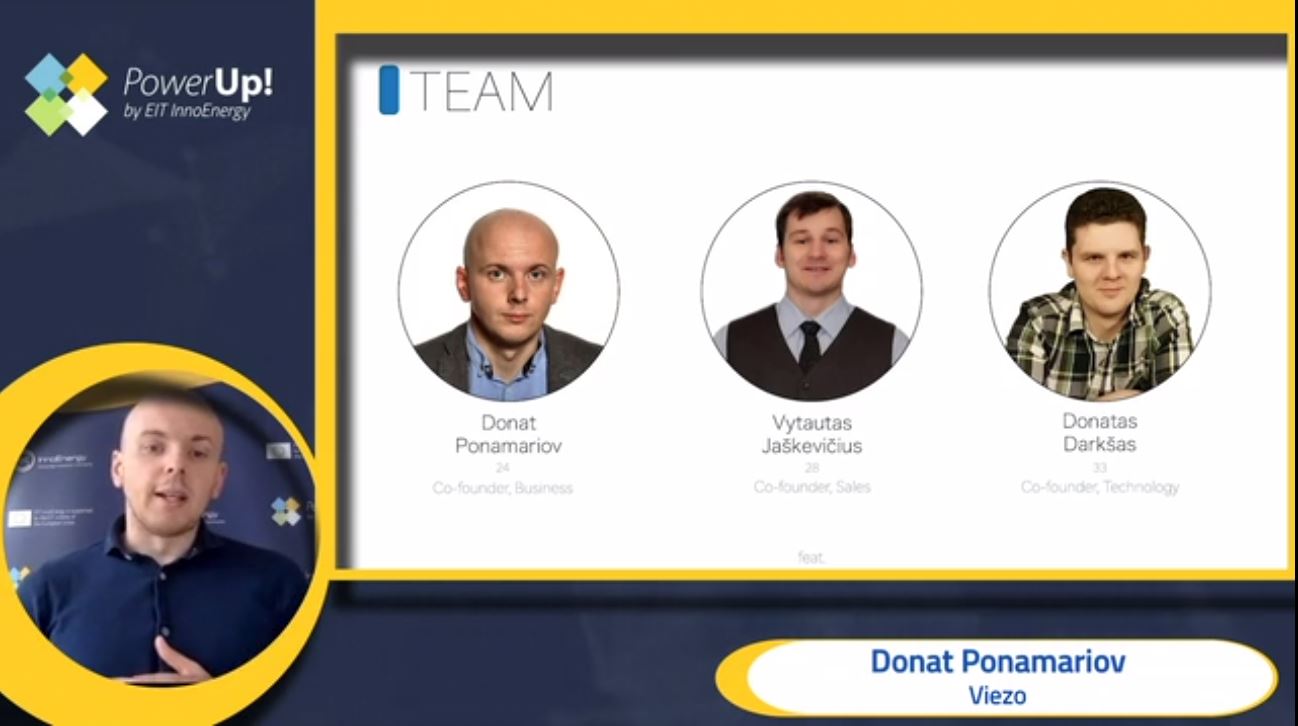The startup from Lithuania won second place in CEE region’s competition “EIT InnoEnergy 2020 PowerUp!” Grand Final
2020
Jun 26
Jun 26

The startup of Lithuania “Viezo” won second place of the region’s most prominent contest for innovative enterprises and business solutions. “Woola” from Estonia was awarded a cheque for 50 000€ as well as the opportunity to join InnoEnergy’s business accelerator programme. The prize is complemented by other valuable contributions from key partners such as Amazon Web Services, Vestbee and the SpeedUp Group. The Challenge saw record participation this year, with over 360 start-ups from 20 countries across Central and Eastern Europe in the running for the main prize and future investment opportunities.
Representatives of this year from Lithuania received €10,000 prize. The startup was founded in 2018 and its work includes developing new types of material that can produce energy from vibrations and use this instead of batteries. The electricity generated from wasted vibrations can power wireless IoT sensors, therefore prolonging their lifetime or increasing the amount of signals.
“We spread the message about ourselves and the feeling is great. The atmosphere was highly competitive, and the winners were worth to win. So, we do not think we have lost, we turned out well”, said Donat Ponamariov from “Viezo“.
Estonia emerged as the winner of the CEE region’s biggest start-up competition organised by EIT InnoEnergy. In the sixth edition of the competition, “Woola” has been awarded the “Startup of the year in the CEE region” title and a cheque for 50 000€, along with the opportunity to join the InnoEnergy’s business accelerator programme. Furthermore, key partner Amazon Web Services offered credits to their AWS Activate program and business support, and other partners such as Vestbee and the SpeedUp Group also awarded the winner with services and grants.
The start-up company was established at the end of 2019 and produces packaging material from sheep’s wool residues.
The Estonian startup aims to disrupt the e-commerce market by significantly decreasing the production, consumption and landfill waste of environmentally harmful materials like Styrofoam and plastic.
Woola is an eco-friendly bubble wrap made from sheep wool. The product is shockproof, heat-proof, and at-home compostable within six months. Woola makes use of an abundant resource that would otherwise be thrown away. Every year, 135 tons of sheep wool ends up in a landfill in Estonia alone.
When selecting the winner, the panel of judges focused on the potential of the presented idea and solution to be successful on a global scale as well as the potential for the long-term development of viable products and services.
“The selection process was highly challenging, as all startups pitched a variety of fantastic products and solutions. In 2020, we saw the biggest potential in the team “Woola” from Estonia. We are excited to see the team’s journey in the future”, said Oksana Prykhodko, Innovation manager at DTEK and a member of the jury.
”We are extremely happy! Winning the title of the Startup of the Year in the CEE region can be a real game-changer for us and help us reach our next goals” – said Anna-Liisa Palatu, from “Woola”. „Participating in the PowerUp! Challenge by EIT InnoEnergy will certainly help in the development of our business”.
“Viezo” from Lithuania, the runner-up of the Grand Final, the startup was founded in 2018 and its work includes developing new types of material that can produce energy from vibrations and use this instead of batteries. The electricity generated from wasted vibrations can power wireless IoT sensors, therefore prolonging their lifetime or increasing the amount of signals. They received a €10,000 prize.
While the third place and a cheque of €5,000 went to the team of “Pocket Virtuality” from Czechia. The company is developing augmented and virtual reality technology that specializes in real-time remote communication. The solution may be used in the fields of engineering, medicine and smart cities. Thanks to this technology, the on-site worker can connect with an external expert who sees a virtual representation of the environment and can fully assist from a distance.
